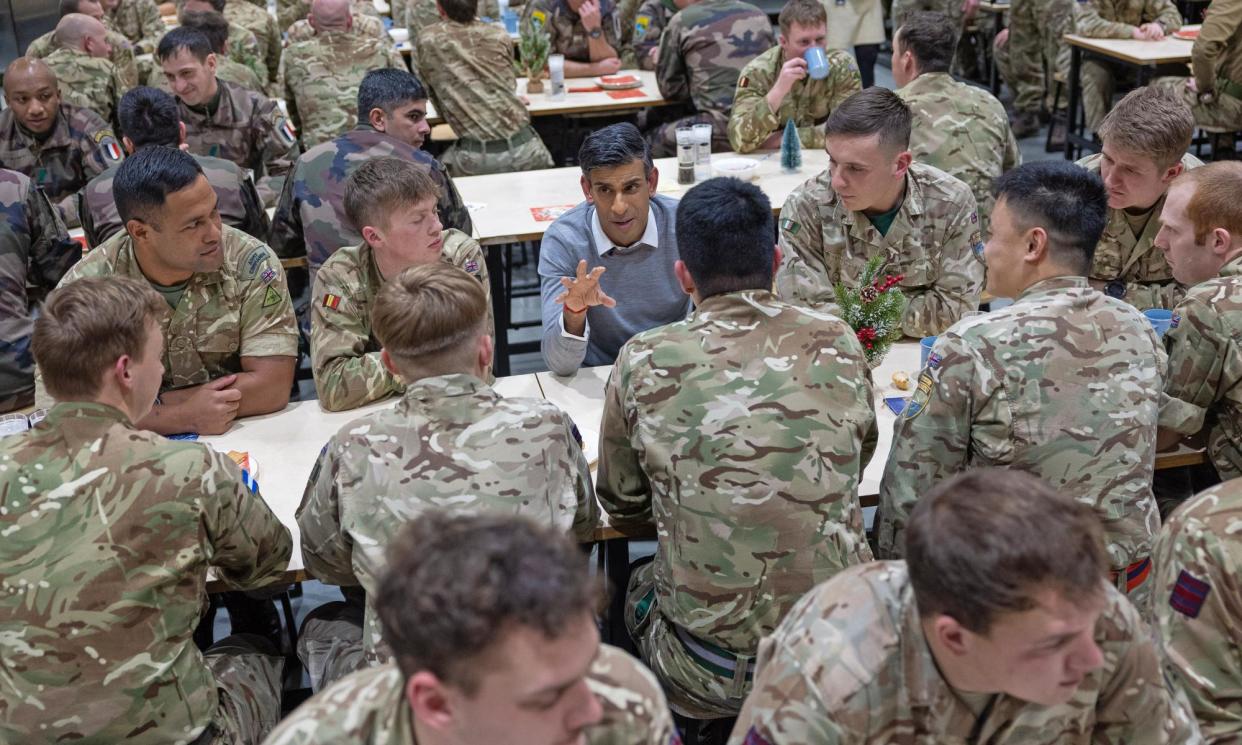Tories’ national service pledge was sprung on candidates, says minister

The Conservative campaign pledge to introduce mandatory national service was dreamed up by advisers and sprung on candidates, a government minister has said.
Criticism of the headline-grabbing policy has centred on claims it was not fully thought through before being announced, while ministers said just two days before the announcement that a return of national service was not on the cards.
“It’s a Conservative party policy. The government’s policy was set out on Thursday,” said the government minister Steve Baker, referring to his colleague Andrew Murrison’s previous insistence there were “no current plans to reintroduce national service”.
Related: Rishi Sunak’s national service pledge is ‘bonkers’, says ex-military chief
Baker, who serves as a minister of state at the Northern Ireland Office, said on Monday: “I don’t like to be pedantic but a government policy would have been developed by ministers on the advice of officials and collectively agreed. I would have had a say on behalf of [Northern Ireland]. But this proposal was developed by a political adviser or advisers and sprung on candidates, some of whom are relevant ministers.”
On Monday, the Labour leader, Keir Starmer, called the proposal “desperate”, claiming the Conservatives were “rummaging around in the toy box to find any plan they can throw on the table”.
He said: “I don’t think it’ll work – you’ve seen what military experts, those with experience have said about it, you’ve seen what the government said about it just a few days ago when they were asked.”
And he added: “The desperation of this national service policy – a teenage Dad’s Army – paid for by cancelling levelling up funding and money from tax avoidance that we would use to invest in our NHS.”
Four days ago, Murrison told parliament: “If potentially unwilling national service recruits were to be obliged to serve alongside the professional men and women of our armed forces, it could damage morale, recruitment and retention and would consume professional military and naval resources.”
In response to a written question from his party colleague Mark Pritchard, the defence minister wrote: “If, on the other hand, national service recruits were kept in separate units, it would be difficult to find a proper and meaningful role for them, potentially harming motivation and discipline. For all these reasons, there are no current plans for the restoration of any form of national service.”
Days later, the prime minister, Rishi Sunak, announced his promise to restore a form of national service. Under the Tory proposal, about 30,000 people would be given the option of applying to serve with the military, while others would carry out different work in their communities.
On Monday, the Foreign Office minister Anne-Marie Trevelyan refused to rule out the possibility of parents being fined if their adult children refused to take part. However, she fended off calls to explain details of the policy proposal, insisting a royal commission would draw them up after the election.
Trevelyan also suggested that failure to carry out national service, should a Tory election victory mean it is reintroduced, could harm people’s job prospects.
She told ITV’s Good Morning Britain: “This will be encouraged and will become part of the norms. Importantly, of course, when you then as a young person apply for a job, there will be a question that employers will want to know how you got involved – either because you were able to achieve one of the 30,000 places [in the armed forces] or because you were volunteering in one or other part of your community.”

 Yahoo News
Yahoo News 
